Majestic
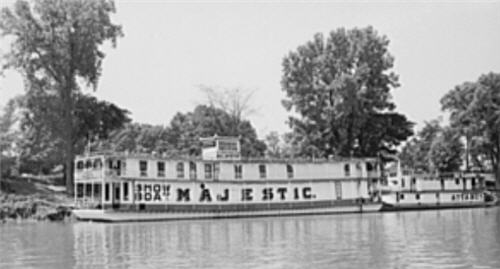
We cast a wide net here at The Daily. We have to. These days it is necessary to duck the sordid reality of what passes for politics in this great land these days. The mysteries will all be revealed soon enough, so there is no point in hashing it out here. What will be, will be.
So, it was with sadness that we noted the passing of Donald “Doc” Shanower a few days ago. His obituary was rich with recollection, including his service as an infantryman at the Battle of the Bulge, the last great German offensive in the war in the West so long ago.
But serving his country was not an exceptional thing to do in those times. Like millions of others, Doc picked up his pack and went to The Show because the fate of the world depended on it- not something you see these days with well-compensated citizens viewing the Anthem as a symbol of oppression.
It is hard to compare the lives of those who went before to those now. Different times, and we live where and when we do, there being no option. But there was more in Donald Shanower’s long and distinguished life that caused some comment.
Our Cajun Correspondent picked up immediately on something that most of us- even the sailors- did not notice. That includes me. Our resident Retired Master Chief Bosun’s Mate is a Coastie- Semper Paratus!- and a national authority on the rules and regulations that govern our inland waters. Aside from the official motto- schoolboy Latin that is commonly translated as “always ready!,” but which any ancient Roman would have told you meant….well…aroused might be the most delicate way to say it.
The unofficial motto that has always summed it up for me is the Coast Guard’s concept of duty: “You have to go out into the storm. You don’t have to come back.”
“Boats” is a proud member of that culture. He has spent a lot of time on our inland waterways, the nation’s original superhighways, and has a lifetime of experience on the rivers of commerce. The notes about Doc and his time on the showboats awakened some memories. He wrote to say that:
“It looks like it was not only the Naval Intelligence Community lost a family member. I note that Mr. Shanower was Theater Director on the show-boat MAJESTIC. All of the Mississippi River Pilots who apprenticed under Capt. Sam Santani on the Steamers NATCHEZ and PRESIDENT were known as graduates of “Mule University.”
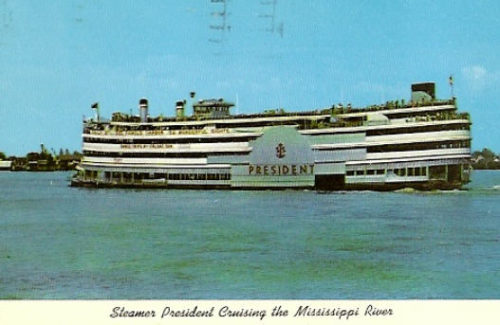
We were addressed as “Mules” by “Captain Sam” until obtaining our First Class or Master Pilot licenses from the USCG. The curriculum at Mule U included the details about the last showboats (mostly theater barges pushed by paddle wheel towboats) and particularly the MAJESTIC. By the time “talkies” came into fashion, the show boats had pretty much disappeared. For generations, the fancy craft had plied the rivers, stopping at the towns and villages along the way to provide entertainment for the folks along the rivers.
For all the riverboat men who preferred the cleaner (and less back breaking) work of the passenger trade on the waterways, this was distressing because most of the overnight passenger steamer trade had disappeared a generation before the passenger trains followed them into oblivion.
Once the showboats were gone almost all “tramping” opportunity (long distance transits) had disappeared from the passenger trades. Between about 1930 and the late 1970s no one could get very long pilotage without time on tow boats, hot dirty, heavy lifting work for a deck hand and relatively nerve wracking for wheelmen and pilots.
I’m part of the generation with a separate Master of Towing Vessels License to accompany my “Any Gross Tons” Masters and First Class Pilot’s licenses’, “Captain Sam” came in at a time when even the acknowledged mast of the river was forced out of the white shirt and gold braid of the Passenger trades and into the tow boat pilot house for a while.
But Captain Sam but learned the better part of his trade from the old Pilots who saw the last of the full spectrum river trade- passengers, freight, and entertainment. In Captain Sam’s day, the passenger trade had degenerated into short ferry service and day excursion boat routes.
There was just no lateral mobility without being licensed to tow. It improved a lot starting in the 70s with the construction of the Mississippi Queen, and other overnight steamers but fell off for a few years after Katrina made New Orleans a less than desirable destination, destroying much of the winter passenger trade on the river. Then the new (starting in the 80s) gaming boat trade eventually got sent to the bank.
Luckily, jobs were preserved by the reluctance of local fire services to regulate vessels. Most gaming boats while confided to dockside, still kept a full marine crew on the roles, including Masters, Mates, Pilots, and Engineers. But as you can imagine, these gambling boat “baby sitting jobs” don’t do much for one’s vertical mobility in the river sector of the Merchant Marine. Yes, life on an excursion boat, passenger steamer, ferry, or gaming boat doesn’t involve much in the way of dirty hands or strained backs for the licensed officers. Passengers want their pictures taken with you in uniform.
If you didn’t know deep down that you evolved from a “mule” one could get a swelled head. The food is really good so the applicants are many. But the days of pilots with egos the size of Texas as described by Mark Twain are long gone. All of the Masters, mates, and pilots in their white shirts, and gold be-striped shoulder boards are one boardroom decision to close a route, or sell a boat away, from returning to dungarees and “pushing barges’.
This has been the story for two generations now, but we have a collective “cultural memory” of the MAJESTIC and that whole era, though only our old mentors saw the tail end of it. Any of us would have been thrilled to meet Mr. Shanower, we’d have seen him as an Icon of our professional history, a senior member of the staff officers of the legendary MAJESTIC. It was part of a story of life on the waters told to us by our elder pilots when we were young and impressionable.”
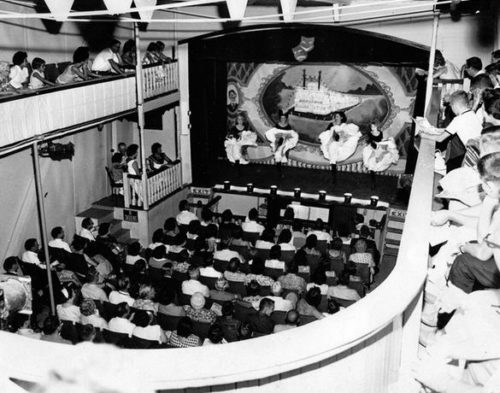
I sent that along to Pat, to let her know that her husband had touched yet another life, even a year after his passing. She responded quickly, remembering more from those amazing days:
“Don was doing his master’s in theater, and I was an undergraduate in the same field when Kent State University and Hiram College took the Showboat MAJESTIC out in 1948. That’s how we met, so that summer has a special place in my memory.
His professor was writing his dissertation (never completed) on the history of showboating and took Don down to see the boat. Don responded, “Why not take it out?” That is exactly what we did, with old Capt. Reynolds at the helm and pushed by the tow boat ATTABOY.
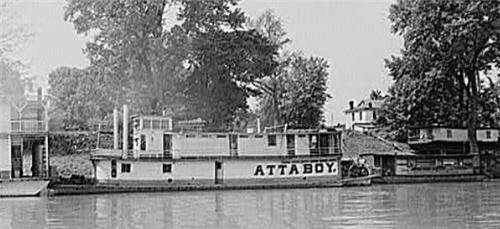
Our student crew not only produced three plays, but also provided a small band to march through the river towns and announce our arrival on the waterfront, and the prospect of some live theater. One member played the calliope atop the superstructure of the boat, and 15 of us slept aboard.
We toured the Kanawha River in West Virginia and then on to the Ohio and had a very successful summer as we stopped in all the little towns. The audience was often quite lively on the nights that the coal miners got paid!
To continue our river experience, we joined another couple to have a great vacation in a boat on the English narrow canals, as well as two family holidays in houseboats on the Mississippi…great memories. Thanks for bringing the subject up.”
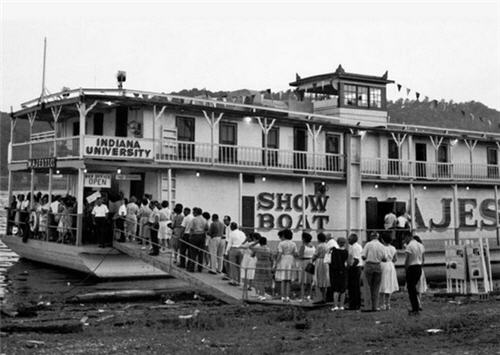
That summer, nearly seven decades ago, the rivers were still alive with the fading culture that opened the great heartland of America. Boats notes that
“Now we are all nearing or passing 70, old and crusty, and in a new century. We’ll die knowing that the river moves more commerce in a single day today than it did in the entire 19th century, that tow boating is still alive and well, even if the calliope is not heard on the river, and the marching band does not parade down Main Street to invite the eager throngs to the show.
But we will never know if the glorious and cushy river passenger trades will ever return to us as anything more than a pale shadow of the bustling, dynamic trade recalled and taught to us by Captain Sam. That time was before the completion of the Army Corps of Engineers navigational improvements that attempt to channel the Big Waters. As Captain Sam would say: “That is the way it was, back before you Mules had yourselves a river!”
Boats mused “why is it that “The Glory Days” never quite occur during our own “heyday?”
I don’t know about that, and won’t be alive to know what the future thinks of the world we have created, and which we will hand off, ready or not. The good news is that there are some people who remember the past as though it were yesterday.
And maybe it was.
Copyright 2016 Vic Socotra, Pat Shanower and Boats
www.vicsocotra.com
